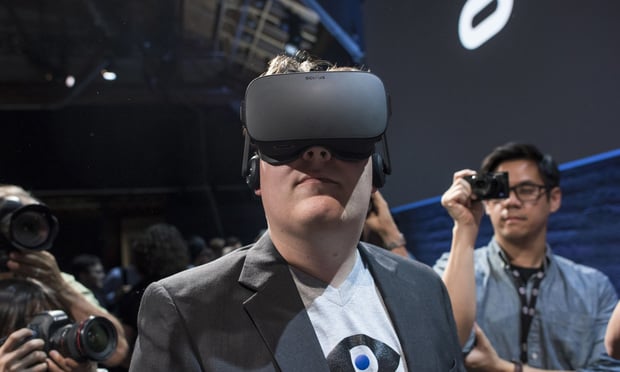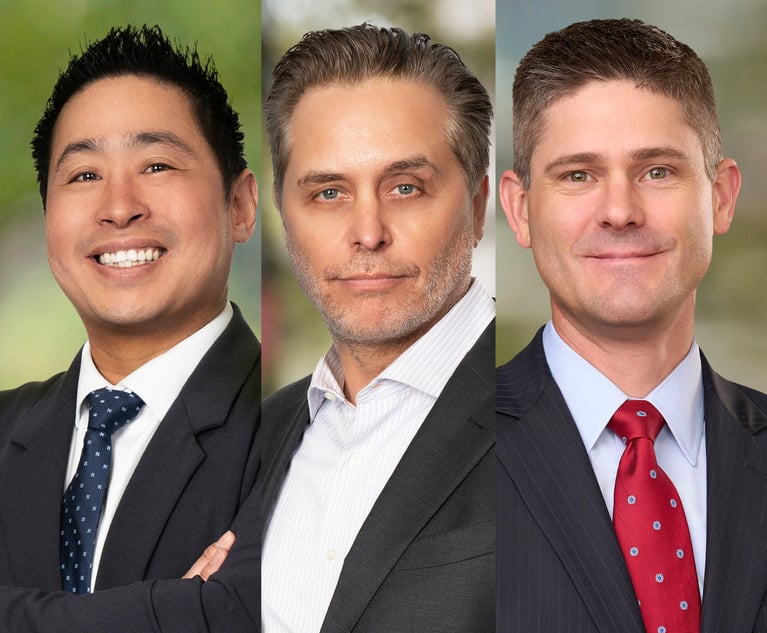Palmer Luckey Likely Headed for Trial in Oculus Rift Technology Dispute
A Ninth Circuit ruling reversing summary judgment in the case marks a win for Quinn Emanuel Urquhart & Sullivan attorneys Robert Stone and Brian Cannon in Redwood City, California, who represented plaintiff-appellant Total Recall Technologies.
June 15, 2020 at 05:57 PM
4 minute read
 Palmer Luckey, co-founder of Oculus VR Inc. and creator of the Oculus Rift, demonstrates the new Oculus Rift headset during the "Step Into The Rift" event in San Francisco, California, on June 11, 2015. Photographer: David Paul Morris/Bloomberg
Palmer Luckey, co-founder of Oculus VR Inc. and creator of the Oculus Rift, demonstrates the new Oculus Rift headset during the "Step Into The Rift" event in San Francisco, California, on June 11, 2015. Photographer: David Paul Morris/Bloomberg
Oculus VR founder Palmer Luckey is set to go to trial over allegations that he wrongly passed off the company's virtual reality headset as his own invention, after a federal appeals court ruling.
In an unpublished memo decision Monday, the U.S. Court of Appeals for the Ninth Circuit reversed a summary judgment order in favor of Luckey and Oculus and kicked the case, which is now poised to go to trial, back to the U.S. District Court for the Northern District of California. The ruling marks a win for Quinn Emanuel Urquhart & Sullivan attorneys Robert Stone and Brian Cannon in Redwood City, California, who represented plaintiff-appellant Total Recall Technologies.
Total Recall Technologies, a partnership between two inventors developing immersive 3D technology, asserted that they entered a contract with Luckey to commercialize their 3D headset product. The partnership later sued Luckey and Oculus, claiming that he breached their contract, formed his own company and created the Oculus Rift based on stolen intellectual property, and then sold the company to Facebook.
Ron Igra, one-half of the Total Recall Technologies partnership, brought the suit—without the consent of his partner Thomas Seidl, in 2015 in the U.S. District Court for the Northern District of California. Oculus' counsel at Cooley in Palo Alto, California, and Mayer Brown in New York argued that Total Recall Technologies' partnership agreement required that both members of the partnership needed to approve of decisions such as litigation. Last March, U.S. District Judge William Alsup agreed and granted the VR company's motion for summary judgment.
Cooley's Mike Rhodes declined to comment on the decision.
The Ninth Circuit panel—made up of Ninth Circuit Judges J. Clifford Wallace and Marsha Berzon and U.S. District Judge Terrence Berg of the Eastern District of Michigan sitting by designation—found that Igra retroactively cured any defect in a timely fashion after Seidl withdrew from the partnership.
"The district court abused its discretion by requiring Thomas Seidl to consent to the action as a condition of ratification," they wrote. "By imposing that condition, the district court compelled Total Recall to keep its same structure and ownership to continue prosecuting the action."
The Ninth Circuit judges said that Igra had "unilateral authority" to control Total Recall's litigation strategy after Seidl's exit. After submitting a declaration consenting to the action and ratifying the filing, "no more was required," the judges wrote.
The court also ruled that Alsup erred when he decided that Igra's ratification of the filing happened too late under the revivor statutes, which mandate that the limitations period will not be tolled for corporations suspended for non-payment of taxes.
"Because Total Recall is not a tax-delinquent corporation, or a suspended corporation for any other reason, the statute of limitations rules under California's corporate revivor statutes do not apply," they wrote.
The ruling concludes the second appeal in the case. In 2018, the Ninth Circuit remanded the case back to the district court after finding that Alsup erred when concluding that state law governed the procedural question of whether Luckey and Oculus could challenge Total Recall Technologies' authority to file the lawsuit.
Quinn's Cannon said that they are pleased with the decision and that they can finally move forward to the merits of the case. It's really an underdog story, he said.
"This is a situation of a Facebook subsidiary being built on the ideas and designs of another," he said. "Our clients are entrepreneurs and inventors, but they are obviously not as big as Facebook. So our clients are seeking to go against the biggest player in the field, to some degree, and we've really had to fight to make this happen."
This content has been archived. It is available through our partners, LexisNexis® and Bloomberg Law.
To view this content, please continue to their sites.
Not a Lexis Subscriber?
Subscribe Now
Not a Bloomberg Law Subscriber?
Subscribe Now
NOT FOR REPRINT
© 2025 ALM Global, LLC, All Rights Reserved. Request academic re-use from www.copyright.com. All other uses, submit a request to [email protected]. For more information visit Asset & Logo Licensing.
You Might Like
View All
White & Case KOs Claims Against Voltage LLC in Solar Companies' Trade Dispute


'A Death Sentence for TikTok'?: Litigators and Experts Weigh Impact of Potential Ban on Creators and Data Privacy

‘Extremely Disturbing’: AI Firms Face Class Action by ‘Taskers’ Exposed to Traumatic Content
5 minute readLaw Firms Mentioned
Trending Stories
Who Got The Work
J. Brugh Lower of Gibbons has entered an appearance for industrial equipment supplier Devco Corporation in a pending trademark infringement lawsuit. The suit, accusing the defendant of selling knock-off Graco products, was filed Dec. 18 in New Jersey District Court by Rivkin Radler on behalf of Graco Inc. and Graco Minnesota. The case, assigned to U.S. District Judge Zahid N. Quraishi, is 3:24-cv-11294, Graco Inc. et al v. Devco Corporation.
Who Got The Work
Rebecca Maller-Stein and Kent A. Yalowitz of Arnold & Porter Kaye Scholer have entered their appearances for Hanaco Venture Capital and its executives, Lior Prosor and David Frankel, in a pending securities lawsuit. The action, filed on Dec. 24 in New York Southern District Court by Zell, Aron & Co. on behalf of Goldeneye Advisors, accuses the defendants of negligently and fraudulently managing the plaintiff's $1 million investment. The case, assigned to U.S. District Judge Vernon S. Broderick, is 1:24-cv-09918, Goldeneye Advisors, LLC v. Hanaco Venture Capital, Ltd. et al.
Who Got The Work
Attorneys from A&O Shearman has stepped in as defense counsel for Toronto-Dominion Bank and other defendants in a pending securities class action. The suit, filed Dec. 11 in New York Southern District Court by Bleichmar Fonti & Auld, accuses the defendants of concealing the bank's 'pervasive' deficiencies in regards to its compliance with the Bank Secrecy Act and the quality of its anti-money laundering controls. The case, assigned to U.S. District Judge Arun Subramanian, is 1:24-cv-09445, Gonzalez v. The Toronto-Dominion Bank et al.
Who Got The Work
Crown Castle International, a Pennsylvania company providing shared communications infrastructure, has turned to Luke D. Wolf of Gordon Rees Scully Mansukhani to fend off a pending breach-of-contract lawsuit. The court action, filed Nov. 25 in Michigan Eastern District Court by Hooper Hathaway PC on behalf of The Town Residences LLC, accuses Crown Castle of failing to transfer approximately $30,000 in utility payments from T-Mobile in breach of a roof-top lease and assignment agreement. The case, assigned to U.S. District Judge Susan K. Declercq, is 2:24-cv-13131, The Town Residences LLC v. T-Mobile US, Inc. et al.
Who Got The Work
Wilfred P. Coronato and Daniel M. Schwartz of McCarter & English have stepped in as defense counsel to Electrolux Home Products Inc. in a pending product liability lawsuit. The court action, filed Nov. 26 in New York Eastern District Court by Poulos Lopiccolo PC and Nagel Rice LLP on behalf of David Stern, alleges that the defendant's refrigerators’ drawers and shelving repeatedly break and fall apart within months after purchase. The case, assigned to U.S. District Judge Joan M. Azrack, is 2:24-cv-08204, Stern v. Electrolux Home Products, Inc.
Featured Firms
Law Offices of Gary Martin Hays & Associates, P.C.
(470) 294-1674
Law Offices of Mark E. Salomone
(857) 444-6468
Smith & Hassler
(713) 739-1250






